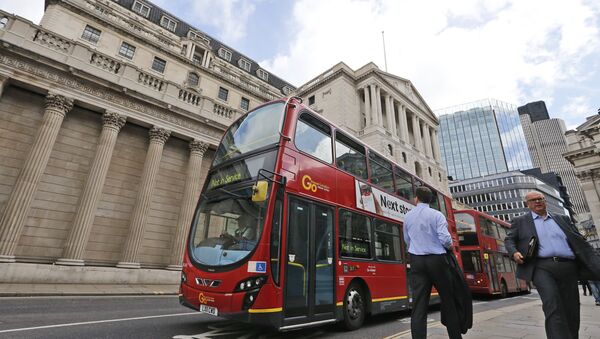Kristian Rouz – A report published on Monday by a British economics think tank, the Centre for Economics and Business Research (CEBR), says the UK will be better off next year. This contradicts murkier predictions as the Bank of England (BoE) prepares its policy response to the challenges of the post-Brexit reality. The report explains that interest rates are rising for the first time in roughly a decade, and will allow the UK to curb inflation and encourage consumption and fixed-investment.
According to CEBR's updated view of the UK economy in 2018, gains in manufacturing and a solid labor market will encourage investment and consumer spending as the monetary authorities prepare to step in to fix the faltering economy.
“We are approaching the moment when the bank rate may need to rise,” Gertjan Vlieghe of the BOE's Monetary Policy Committee said.
UK inflation, which is far above the 2-percent BOE target, is inspiring the anticipations of the regulator’s tougher stance on monetary policy. Market participants are expecting a rate hike in February 2018, and the pound’s gradual revaluation supports the view. The pound has risen to $1.35, which is very close to its pre=Brexit vote gauge of $1.41-1.60, compared to the slump down to as low as $1.16 last summer.
“UK economic growth has unquestionably slowed from the rates seen throughout much of 2016,” Nina Skero of CEBR said. “Many have mistaken recent headwinds for a full-blown storm.”
However, BOE Governor Mark Carney rushed to cool the enthusiasm of policy bulls, saying Britain is still lagging behind other G7 nations economically, which is only the third time in three decades the UK experienced such an economic slowdown.
“There remain considerable risks to the UK outlook,” the BOE’s Carney said.
Carney also warned of the downside short-term effects of Brexit on the UK’s foreign trade, reiterating that establishing new trade ties or reviving connections with the former British Empire nations will take time.
“Any reduction in openness with the EU is unlikely to be immediately compensated by new ties of a similar magnitude with other trade partners,” the BOE governor said. “And even if new agreements with other partners could be struck instantaneously, the reorientation of business relationships will take some time.”
According to Carney, the UK is poised to underperform economically until at least mid-2018 compared to other G7 nations.
At the same time, expert focus is pivoting from monetary policy to the fiscal policy side, as the Cabinet's new economic measures are poised to benefit the economy to a greater extent than monetary policy, the effects of which are waning after almost a decade of quantitative easing.
“Mark Carney is right to be gloomy about our post-Brexit prospects if we continue to follow the prescription of the Treasury, the CBI and the Bank of England,” John Longworth of the British Chambers of Commerce (BCC) said. “If however we adopt the positive economy advocated by Boris Johnson and James Dyson, Britain’s economy will boom.”
The UK has experienced a slowdown in consumer spending since last summer’s Brexit vote, however, with unemployment currently at its multi-decade lowest at 4.3 percent, people are getting back to shopping.
The CEBR says that inflationary pressures will ease, in line with rising interest rates, while a deal with the EU, when it’s finally reached, will ease the uncertainty and propel the economy beyond next year.



